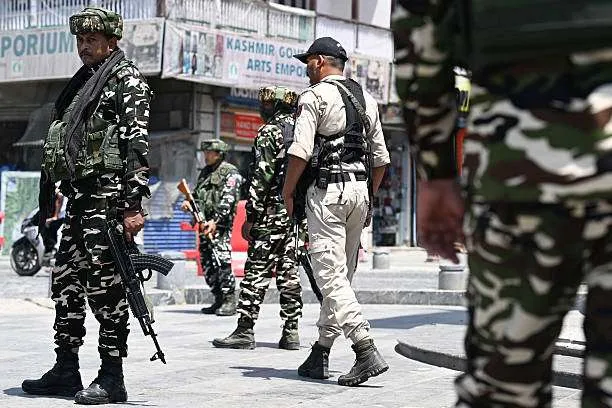Anger grows in Kashmir over mass detentions after deadly attack blamed on Pakistan
Tensions surge between India and Pakistan as Kashmir witnesses sweeping crackdowns and escalating violence.
 |
| Indian paramilitary troopers stand guard in a market area in Srinagar on April 28, 2025. Photo by Tauseef Mustafa/AFP |
By Anna Fadiah and Hayu Andini
Anger grows in Kashmir as authorities continue mass detentions and security crackdowns following a deadly attack last week that India squarely blames on its arch-rival Pakistan. The killing of 26 civilians in Indian-administered Kashmir on April 22 has unleashed one of the most sweeping security operations in recent years, heightening regional tensions and stoking fears of potential military escalation.
New Delhi has accused Islamabad of backing "cross-border terrorism," describing the assault as the deadliest targeting civilians in the disputed region in more than 25 years. Pakistan, however, has vehemently denied involvement, calling any attempt to link it to the killings "frivolous" and warning that it would respond robustly to any Indian provocation.
The fallout from the attack has sent already fraught India-Pakistan relations into a fresh downward spiral, with analysts warning of a dangerous slide toward military confrontation.
Thousands detained amid intensified manhunt
The immediate aftermath of the April 22 killings saw Indian security forces launch an aggressive manhunt for the attackers. Nearly 2,000 people have been detained for questioning across Kashmir, according to a senior police official, who spoke anonymously due to restrictions on talking to the media.
Security forces have also destroyed at least nine homes belonging to men suspected of having ties to militant groups. The mass detentions and property demolitions have fueled widespread anger among Kashmiris, many of whom feel they are being collectively punished.
"Punish the guilty, show them no mercy, but don't let innocent people become collateral damage," Jammu and Kashmir's Chief Minister Omar Abdullah urged in a statement aimed at calming rising resentment.
Federal lawmaker Aga Ruhullah echoed the frustration, stating that "Kashmir and Kashmiris are being given a collective punishment," a sentiment increasingly resonating among residents of the conflict-torn region.
Cross-border clashes add to fears
While anger grows in Kashmir over the detentions and demolitions, tensions along the de facto border with Pakistan — known as the Line of Control — have also escalated. India's army reported exchanges of small arms fire with Pakistani forces for the fourth consecutive night, although no casualties have been confirmed.
The Indian army accused Pakistani posts of initiating "unprovoked" fire across the border during the night of April 27-28. In a statement, it said Indian forces responded "swiftly and effectively" to the firing. Pakistan has yet to confirm or deny the latest clashes.
The border skirmishes underscore the volatility of the situation. Kashmir, a Muslim-majority region, has been divided between India and Pakistan since 1947, but both claim the territory in its entirety. A decades-old insurgency in the Indian-administered portion has led to frequent flare-ups and military tensions.
Hunt for attackers intensifies
In a bid to track down those responsible for the attack, Indian police have issued wanted posters for three men: two Pakistanis and one Indian. Authorities allege that the suspects are members of Lashkar-e-Taiba, a Pakistan-based militant group that the United Nations has designated a terrorist organization.
Authorities have offered a bounty of two million rupees (about $23,500) for information leading to the arrest of each man.
Beyond these main suspects, Indian security forces are sweeping through communities, questioning residents and detaining those suspected of having any information about the attackers. A senior police official described the process as a "revolving door" at police stations, with detainees being released and summoned again depending on ongoing investigations.
The aggressive tactics have drawn criticism from locals who say innocent people are bearing the brunt of the crackdown.
Families caught in the crossfire
The anger grows in Kashmir not only because of mass detentions but also due to reports of homes being destroyed without proof of direct involvement. Yasmeena, the sister of accused fugitive Ashif Sheikh, told reporters that her family home had been demolished even though they had not seen her brother in three years.
"If my brother is involved, how is it the family's sin?" she asked. "This house doesn't belong to him alone."
Human rights groups have warned that such actions could further alienate Kashmiris and potentially fuel more unrest in a region already scarred by decades of violence and mistrust.
Diplomatic fallout widens
Beyond the local impact, the April 22 attack has triggered serious diplomatic consequences. India has downgraded its diplomatic ties with Pakistan, canceled visas for Pakistani nationals, suspended a longstanding water-sharing treaty, and closed its main land border crossing with its neighbor.
Islamabad retaliated by ordering Indian diplomats and military personnel to leave, canceling visas for Indian citizens, and barring Indian planes from Pakistani airspace.
Indian Defence Minister Rajnath Singh met with Prime Minister Narendra Modi on Monday to discuss potential responses. Last week, Singh warned that those behind the killings would hear India's response "loud and clear," further stoking speculation that military action could be on the table.
Calls for restraint amid fears of escalation
Amid the rising tensions, the United Nations has called on India and Pakistan to exercise "maximum restraint" and resolve their differences through "meaningful mutual engagement."
Other countries have also stepped in. Iran has offered to mediate between the two nuclear-armed neighbors, while Saudi Arabia said it is working to prevent a wider escalation of hostilities.
Despite these efforts, the anger grows in Kashmir, and the sense of injustice among the local population remains high. Many Kashmiris fear that as long as civilians are swept up in collective punishments, genuine peace and justice will remain elusive.
As investigations continue and diplomatic tensions simmer, the world watches closely, hoping the crisis does not spiral further out of control.
